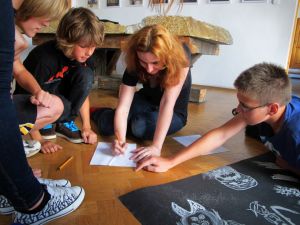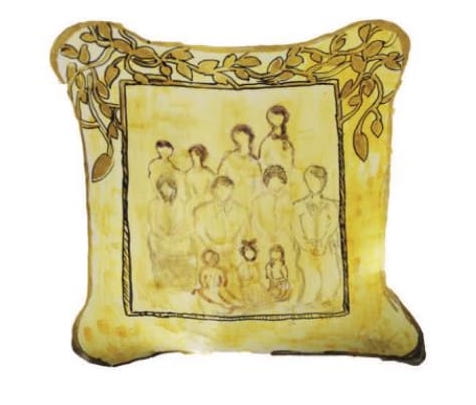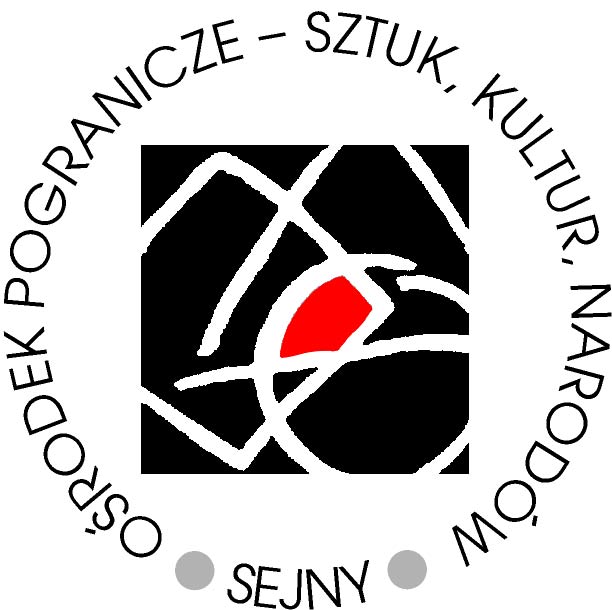A conversation with Joanna Polak

You can also amaze the world from the small Sejny. A conversation with Joanna Polak
MKU: I am curious about the festival life of films made in Borderland. They are made with deep thought and are tightly linked to the place. Does it influence their reception?
JP: I believe borderlands are a universal category. I always emphasize that when I am asked to give a lecture that borderlands of cultures or of neighbourhoods can be found everywhere. In this sense, the films deal with issues well known to global audiences.
In addition, films created in Borderland are appreciated and recognized for their educational value. The Film Collections also arouse great interest among teachers, we occasionally present them at methodical conferences where DVDs sell like hot cakes. The films are our pride and joy, especially since together with Bożena Szroeder we have developed a method of working on animation with the young.
MKU: Could you give some details?
JP: The method follows Janusz Korczak’s thought that a child should be treated the same way we treat an adult. We recognize each member of our workshop, irrespective of their age, as a person responsible for not only the artistic result of their work, but also for the whole work as its full-time co-author. So for example, we adjust a workshop to children's’ capabilities, and they in turn prepare and select on their own drawings which are to become later a storyboard watched by them during their work. The role of the adult is a subtle correction of their work during film editing and it is them who have an impact on the overall effect.
I want to share with you an anecdote about what it looks like in practice. At the film “About Man and his Devilish Partner” we worked on a very old board and had to use chalk to draw. There is this scene about rustling fields of corn in which the corn keeps growing - to achieve this effect as the scene developed we had to ask taller and taller children to draw.
MKU: Do you share your methodological idea at festivals and workshops you go to? How was it received?
JP: Of course. I’m often invited to workshops to present methods of our work. The method is an integral part of the Borderland Film Collections. It may sound surprising to you, but it still happens that it raises a lot of controversy. Because we sign the films with our names, with Daria Kopiec or Liza Skworcowa as directors, there are doubts as to the degree of our interference in the final effect. After a presentation of one of make-ofs in Poznań, they decided to create a separate category of “films made under adult supervision”. Such a change in mentality is a great breakthrough.
We still perfect our method and work much more freely than before. It requires a thorough preparation of the workshop and workplace by adults for children to show their creativity. But you still need to remember that it is also hard work for them which we treat very seriously.
That is the reason we send our films to festivals. When it turns out that one film was awarded abroad it means a lot to its young makers. It shows that the place of origin is not so much important - you do not need to live in a metropolis of millions or thousands of inhabitants. You can also amaze the world from the small Sejny.
MKU: Did you ever happen to have a surprising workshop or festival trip?
JP: More than once. Sometimes it amazes me that very traditional techniques can arouse great interest. This happened last year in Seattle. As a film-maker I use 25 techniques (including drawing, cut-outs, loose matter, puppet, plasticine, collage, chalk animation, pixilation, shadow theatre or polygon), many of them I used in my work at Borderland. While in Seattle I was asked to run a workshop in loose matter, we worked with spices.
MKU: What does your work with Borderland children look like?
JP: I come to Sejny quite rarely due to numerous professional commitments, but it is one of those places I like coming back to and with a fondness for it. I work with small groups: sometimes they are children, youth, sometimes families, so that I can give my attention to each person. My cooperation with Borderland is not just about cooperation in making animated films, I have been working on whole programs on recognition of neighbours, exploring history or family memories. So the films made in Borderland are a tool for creation of the story of the place.
MKU: Thank you for the conversation.
An interview with Joanna Polak by Marta Kowerko-Urbańczyk.
Joanna Polak (born 1978) director of animated films. Graduate of the State Fine Arts Secondary School in Lublin and Multimedia Communication Department of Fine Arts Academy in Poznań. In 2003, she was awarded MA in filmmaking, television and photography, majoring in animation. In 2011, she was awarded a doctorate from Maria Curie-Skłodowska University of Lublin. He is the author of the book "Hotel Mirage - computer cutout in film therapy"; a member of ASIFA Poland (Association Internationale du Film d'Animation - International Animated Film Association) an association of film-makers and people connected with the animation film community, and of the Association of Polish Artists and Designers in Lublin.
She conducts experiments in the field of digital graphic animation. Apart from the strictly artistic pursuits, she is also interested in the pioneer research in film therapy; the interesting results achieved by her in the field are a result of her collaboration with the researchers from the dependency treatment centres and her involvement in a homelessness fighting project. Her films, video installations, photographs, sculptures, macramé, and paintings have been presented in dozens of exhibitions and festivals around the world. She authored over 100 films, most of them animated. She co-operates with the Polish Television.
Her films and video installations have been shown in over 300 festivals, presentations, and by 18 TV channels (in Europe, Asia and the USA). Her films won 25 prizes and awards (in Lublin, Poznan, Cracow, Gdansk, Wągrowiec, Lodz, Torun, Wroclaw, Niepokalanow, Lubliniec, Warsaw, Budapest, Hungary, Ostrava, Czech Republic, Varaždin, Croatia, and Philadelphia, USA).
She teaches animation and multimedia graphics at the Maria Curie-Skłodowska University in Lublin and Polish-Japanese Academy of Information Technology in Warsaw.
In Borderland, she co-authored four Borderland Film Collections and the Mysteries of Childhood Collection.
http://pogranicze.sejny.pl/filmowa_kolekcja_bajek___filmy,685-1,10681.html
http://pogranicze.sejny.pl/filmowa_kolekcja_bajek___realizatorzy,685-1,10688.html
http://pogranicze.sejny.pl/filmowa_kolekcja_bajek_piesni_pogranicza___kolekcja_druga,1125.html
http://pogranicze.sejny.pl/filmowa_kolekcja_bajek_opowiesci_pogranicza___kolekcja_trzecia,1435.html
http://pogranicze.sejny.pl/kolekcja_filmowa_misteria_dziecinstwa,1820.html
More on the artists website: http://www.joannapolak.com/








